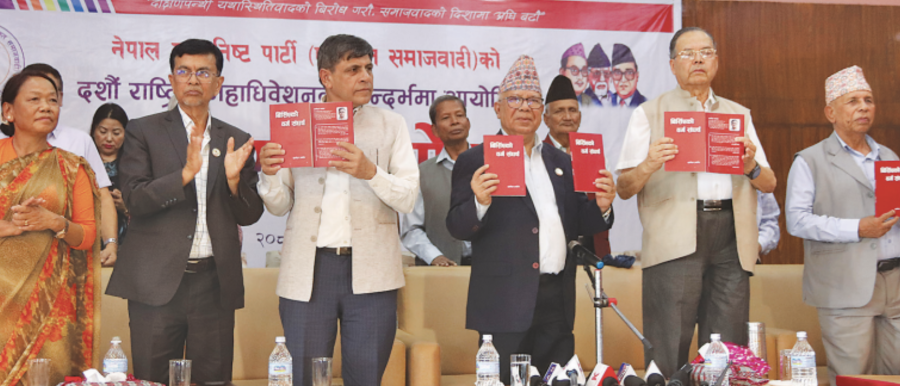Politics
Unified Socialist leaders mull consensus leadership as convention starts today
Chances of Madhav Nepal’s continuation as party chair high but two others in the fray too.
Purushottam Poudel
With the CPN (Unified Socialist) all set to inaugurate its general convention on Sunday, the party’s leaders are engaged in intense negotiations on electing the new leadership.
While there are reports of some leaders poised to contest key posts, party leaders said they are trying to elect the leaders in consensus as well.
Putting the statements and information given by multiple leaders together gives an impression that they are giving continuity to parallel activities. They are making an effort to select leaders through consensus but are preparing to contest posts if consensus eludes and the party chooses to hold an election for leadership positions.
Party insiders do not expect many changes at the top. They said more or less the same set of leaders are likely to retain key posts.
According to them, as second-rung leaders are hesitant to challenge the old guard at the convention, the latter’s chances of being unseated are slim.
“The quality of leadership of a communist party is more important than the age of leaders,” says Ashesh Ghimire, a central committee member of the party. Ghimire, like other young leaders of the newest communist outfit of Nepal, believes old leaders are not necessarily apathetic to the concerns of young ones.
“The party secretariat should select the party’s new leadership based on consensus,” Ghimire adds. Most of the current secretariat members are old faces.
A group of CPN-UML leaders, led by Madhav Kumar Nepal, the party’s former chief, split the country’s largest communist party to form the Unified Socialist in August 2021. They explain their split as a revolt against UML chair KP Sharma Oli’s decision to dissolve the House of Representatives twice.
Following a poor show in the 2022 elections, where it failed even to secure the status of a national party, the Unified Socialist is struggling to retain its members. Despite holding important portfolios in the federal and provincial governments, party leaders are struggling to stop its members from going back to the UML, let alone attract new members.
Amid diminishing influence, the party is holding its general convention, from Sunday to Thursday.
As a total of 1,875 representatives selected from across the country are gathering in Kathmandu for the event, said a leader.
“The chances of electing the office bearers and appointing them based on consensus are fifty-fifty,” Deputy General Secretary Bijay Paudel told the Post. “The party leadership is still in discussion to settle the matter.”
However, Secretary Ramkumari Jhakri says the appointment of office bearers should be based on consensus rather than an election. “I will play my part in selecting the leadership in consensus,” Jhakri told the Post.
Many leaders the Post spoke to fear that electing the leadership might weaken the party by polarising the representatives. “We have already split a party [the CPN-UML]. Now our primary focus should be on strengthening the new party,” an office bearer told the Post seeking not to be identified. “An election to pick party leadership will again sow seeds of division among us.”
Incumbent chair Madhav Nepal, senior leader Jhala Nath Khanal, and General Secretary Ghanashyam Bhusal are clear contenders for the top post.
Khanal and Bhusal are likely to ally against Nepal if the party goes for a vote to elect the chair.
Though Khanal still claims to be in the top leader race, many party insiders view it as a strategic move. He will hold his cards close to chest until the nomination process starts, said a leader.
“Most likely, the party leadership will be selected through consensus. However, if an election happens, it will be between Nepal and Bhusal,” said a leader.
If the leaders choose office bearers based on consensus, most leaders may retain the positions. For instance, Nepal may remain the chair, Khanal the position of senior leader and Bhusal the general secretary, says the leader.
Party insiders also claimed that based on his hold on the party, it would be difficult for other leaders to dethrone Nepal. He commands a majority of the 20 current office bearers. However most leaders also add a rider that as politics is a game of possibilities, some unexpected outcomes can’t be ruled out.
“The possibility of trilateral competition—between Nepal, Khanal and Bhusal—is very low,” the leader said. “In the event of a contest between Nepal and Bhusal, there is a possibility that Khanal will support Bhusal.”
But deputy general secretary and head of the party’s publicity department Jagannath Khatiwada downplayed such a possibility. “Till now, leaders only have tried to gauge the viability of their candidacy, and so Khanal has not left the race,” Khatiwada told the Post. “It would be too early to predict this or that leader will lead the party.”
Senior leader Khanal also bats for the selection of the leadership on consensus basis. Addressing the media on the eve of the general convention, Khanal pointed out a path of consensus.
“We might have debates in the party on some agendas. But that is natural in a communist party,” Khanal said. “Let us select the party leadership based on consensus so that it can lead the society in the right direction.”
Meanwhile, party leaders have decided to increase the number of office bearers. The party statute has been amended to increase their number to 21 from the current 20. The party will have a chairman, senior leaders, a senior vice-chair, and seven vice-chairs, including one woman, a general secretary, four deputy general secretaries, and seven secretaries.
“Including the senior leader, our party will have 22 office bearers. However, the sammanit neta [respected leader] is not counted in the total as it is not an official post,” Khatiwada said. The position has been given to Khanal.
The party also decided to increase the number of central committee members from 119 to 219.




 14.12°C Kathmandu
14.12°C Kathmandu














